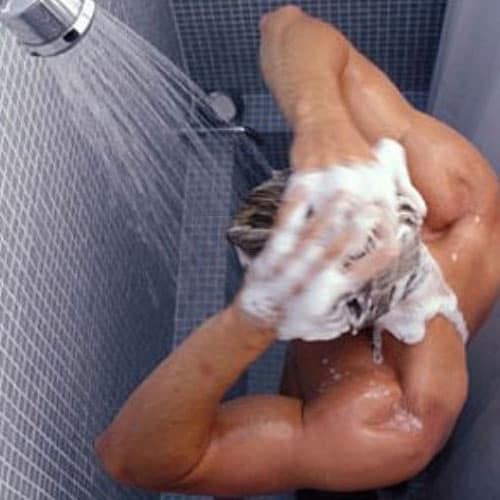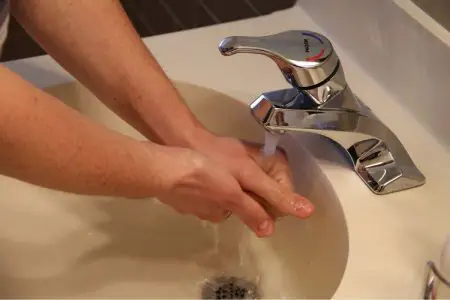All good things must come to an end. That should not apply to the hot water in your shower, however.
If you are frequently the last one in the shower and end up with cold water, or your hot water doesn’t last long like it used to, then you’ll need to figure out why.
There are several reasons why your hot water doesn’t last long, from too small a tank to your heater being too old and needing to be replaced.
In this article, I will go over several reasons that you may be running out of hot water too quickly and how to fix it.

4 Reasons You’re Running Out Of Hot Water Too Fast
Hopefully, after reading this article you find a quick hack to get more hot water. Usually, this is not the case, though. In this section, I will go over the most common reasons your hot water doesn’t last long.
1 – Your Water Heater Is Too Old
If you were getting enough before, but now you are running out of hot water faster than before, it is a sign that your water heater is too old.
How do you know if your heater needs to be replaced?
Besides the fact that you’re getting cold water too quickly, here are some other signs that you need to get rid of your old heater:
- If it is more than 10 years old – Most tank storage water heaters only last up to 10 years. You can sometimes get more than that out of them if you maintain them well. If you are over the 10 years and you run out of hot water then it is time to replace it.
- Rusty water – If you are not on a well and never had trouble with iron in your water before, then rust is a sure sign its time is up. It is likely to spring a leak soon, so best to get rid of it ASAP.
- Rumbling noises – It’s normal to hear your water heater kick on and off. It isn’t normal for it to sound like it is about to launch out of your basement. If the noises are getting loud and sound worrisome, then dump it already.
- Leaks – Leaking hot water heaters are the surest sign that they are ready for the salvage yard. You can’t trust a small leak to stay small. Eventually, you will come home to your basement flooded because of your heater.
What should you replace your water heater with? I recommend a tankless water heater for most people. If you love the idea of endless hot water, then a tankless is the way to go.
Here you can check out my list of the best whole house tankless water heaters so you can get an idea of what they are all about.
You’ll never have to deal with running out of hot water, as long as you size your water heater correctly.
2 – Your Water Heater Is Too Small
If your family is growing, or your hot water demand is higher than before, then it simply means you’ve outgrown your water heater capacity. It’s time to switch it out for a bigger one.
How do you know what the right size is for a water heater?
The basic guidelines go like this:
- 1 to 2 – 30-gallon water heater
- 2 to 3 – 40-gallon water heater
- 3 to 4 – 50-gallon water heater
- 5 or more people – 50-80 gallon water heater
3 – Sediment Buildup in Your Water Heater
If you have well water then chances are that you have sediment coming into your plumbing. This sediment slowly builds up within your tank and that means less water. Less water in your tank means you run out of hot water faster.
Even if you don’t have well water, you could still see particles accumulating at the bottom of the storage tank.
Minerals from hard water, rust, and other matter all build up and ruin your heater’s efficiency as well as leave you with cold water.
At the end of the life of a hot water heater, there is usually a considerable amount of build up at the bottom of the tank.
There is a way to fix this problem, though. Hopefully, you saved the manual from your water heater because it will have instructions on how to flush it. You should be doing this on a regular basis, maybe once a year or two, but even if you haven’t and suspect this is the cause, then flush it now.
With a water heater flush kit, you will get all of the sediment out of it with a simple loop that flushes everything out. Click that link and you’ll see what a simple system it is. It’s something you can do yourself, and the cost of the kit is less than what you would pay a plumber.
4 – It’s A Broken Thermostat
If your water heater is not that old and your hot water demand is not any higher then it used to be before, then the culprit may be the thermostat. In fact, it is the first thing to check if your water heater is not showing any signs of age.
To see if it is indeed the problem, then try resetting it. It may actually start producing hotter water right after that. If not then raise the temperature as high as it goes and see if the problem persists.
If neither of those things works then you’ll need to get a multimeter to test if the thermostat is working. If it comes back without a voltage reading then it means you need to replace the thermostat.
Find the one for your make and model and replace it. You will probably need a professional to replace it for you.
Read More!
If you end up with the opposite problem and have scalding hot water then read this article about why your water heater is overheating.
Do You Need A Plumber?
When it comes to replacing a water heater it’s probably a good idea to have a professional.
If you are going to instead install a tankless water heater, then you can do it yourself depending on a few things. If you wonder what it takes to install your own, check out this article on how much it costs to install a tankless water heater.
Hopefully, your problem is something simple that can be done with just a few adjustments or maintenance. Otherwise, I think your best bet is to go the route of replacing your water heater with something more efficient and reliable.

Nick Lopresti is the founder of YourH2Home and a home improvement expert. He has years of experience writing about various home improvement topics, mostly as it pertains to water systems.
